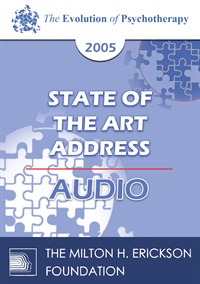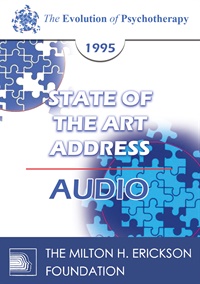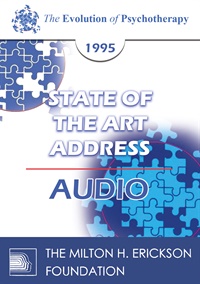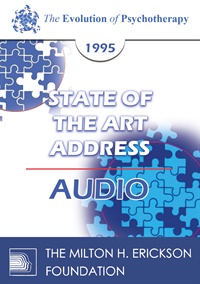- Average Rating:
- Not yet rated
- Topic Areas:
- State of the Art Address | Psychotherapy | Therapist Development
- Categories:
- Evolution of Psychotherapy | Evolution of Psychotherapy 2005
- Faculty:
- Robert Dilts, BA
- Course Levels:
- Master Degree or Higher in Health-Related Field
- Duration:
- 1:04:27
- Format:
- Audio and Video
- Original Program Date:
- Dec 11, 2005
- Short Description:
- The notion of "logical levels" refers to the fact that some processes and phenomena are created by the relationships between other processes and phenomena. The function of each level is to synthesize, organize and direct the interactions on the level below it. Changing something on an upper level would necessarily radiate downward, precipitating change on the lower levels. This presentation will cover the six basic levels of therapeutic change: environment, behavior, capabilities, beliefs and values, identity and spiritual.
- Price:
-
Sale is $29.00
price reduced from Base Price - $59.00

- Average Rating:
- Not yet rated
- Topic Areas:
- State of the Art Address | Psychotherapy | Therapist Development
- Categories:
- Evolution of Psychotherapy | Evolution of Psychotherapy 2005
- Faculty:
- Harville Hendrix, PhD
- Duration:
- 51 Minutes
- Format:
- Audio Only
- Original Program Date:
- Dec 11, 2005
- Short Description:
- For decades, psychotherapy based upon the paradigm of the individual, has focused on the intrapsychic world of the client. The focus is now shifting to the interpersonal, as a result of the appearance of the relational paradigm from the collective unconscious. This shifting of paradigms will challenge and transform the process of diagnosis and therapeutic interventions of all forms of therapy. This address will outline this historical shift and suggest its implications for therapy theory and practice.
- Price:
- $15.00 - Base Price
- Average Rating:
- Not yet rated
- Topic Areas:
- State of the Art Address | Neurobiology | Psychotherapy
- Categories:
- Evolution of Psychotherapy | Evolution of Psychotherapy 2005
- Faculty:
- Daniel Siegel, MD
- Course Levels:
- Master Degree or Higher in Health-Related Field
- Duration:
- 1:02:46
- Format:
- Audio and Video
- Original Program Date:
- Dec 11, 2005
- Short Description:
- Interpersonal neurobiology is a way to define mental health and the kinds of social experiences the brain requires to achieve a coherent mind. This interdisciplinary synthesis of science reveals an exciting convergence among research findings that helps us in mental health to explore the interplay among relationships, the mind and the brain. Experience shapes the connections in the brain in ways that we can now understand and harness within psychotherapy to help stimulate the neuronal activation and growth necessary to achieve resilience and emotional well-being.
- Price:
-
Sale is $29.00
price reduced from Base Price - $59.00
Tags: Neurobiology Psychotherapy
- Average Rating:
- Not yet rated
- Topic Areas:
- State of the Art Address | Rational Emotive Behavior Therapy (REBT) | Brief Therapy | Psychotherapy | Therapist Development
- Categories:
- Evolution of Psychotherapy | Evolution of Psychotherapy 2005
- Faculty:
- Albert Ellis, PhD
- Course Levels:
- Master Degree or Higher in Health-Related Field
- Duration:
- 57:01
- Format:
- Audio and Video
- Original Program Date:
- Dec 11, 2005
- Short Description:
- Dr. Ellis will describe the up-to-date principles and practice of Rational Emotive Behavior Therapy (REBT) in the twenty-first century, how some people are trying to water it down, and what its future will probably be.
- Price:
-
Sale is $29.00
price reduced from Base Price - $59.00

- Average Rating:
- Not yet rated
- Topic Areas:
- State of the Art Address | Children and Adolescent Therapy | Psychotherapy
- Categories:
- Evolution of Psychotherapy | Evolution of Psychotherapy 1995
- Faculty:
- Stella Chess, MD
- Duration:
- 56 Minutes
- Format:
- Audio Only
- Original Program Date:
- Dec 16, 1995
- Short Description:
- The implications of our investigations into the nature and influence of temperament will be· elaborated by the concepts of temperament-environment interactions, goodness of fit and parent guidance as well as guidance of adolescents and adults in psychotherapy. These formulations will be applied to psychotherapeutic clinical practice with children, adolescents and adults. A 22 minute illustrative videotape will be shown.
- Price:
- $15.00 - Base Price
Tags: Adolescents Children Psychotherapy

- Average Rating:
- Not yet rated
- Topic Areas:
- State of the Art Address | Psychotherapy | Relationships
- Categories:
- Evolution of Psychotherapy | Evolution of Psychotherapy 1995
- Faculty:
- Lynn Hoffman, ACSW
- Duration:
- 54 Minutes
- Format:
- Audio Only
- Original Program Date:
- Dec 13, 1995
- Short Description:
- This talk proposes to separate psychotherapy approaches into two groups: one called the "psychological therapies," focused on the growth and development of the individual psyche, and the other, the "social therapies," which deal with broader issues of relationship and the social web. My aim is to create a freer field for dialogue between two points of view that are historically independent from each other and that derive from a different conceptual base.
- Price:
- $15.00 - Base Price
Tags: Psychotherapy Relationships

- Average Rating:
- Not yet rated
- Topic Areas:
- State of the Art Address | History of Psychotherapy | Psychotherapy
- Categories:
- Evolution of Psychotherapy | Evolution of Psychotherapy 1995
- Faculty:
- Margaret Singer, PhD
- Duration:
- 1 Hour 3 Minutes
- Format:
- Audio Only
- Original Program Date:
- Dec 16, 1995
- Short Description:
- During the five decades that I have been a psychologist, I have seen a series of psychotherapeutic practices come and go. Today, one in three Americans has visited one or another of the 250,000 accredited practitioners making offerings. Not only has the number of therapists burgeoned, but also the varieties of therapy have become a veritable smorgasbord. Assumptions underlying various bursts of therapist zeal will be explored and linked to prominent cultural and social forces in recent history.
- Price:
- $15.00 - Base Price
Please wait ...




